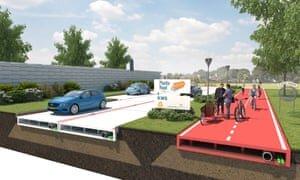Plastic may no longer go directly into landfills, but into the roads we drive on. In downtown Los Angeles there will be a street made from recycled plastic. The city will be able to grind up existing roads and replace them with sustainable products. According to officials, the plastic will make the street stronger and more suitable for driving than before.
The company, TechniSoil Industrial, has completed trials to ensure the safety of the recycled roads. They even say that roads paved with plastic can last approximately 13 times longer than cement roads.
“New synthetic binders are going to transform the global road construction or road rehabilitation marketplace, and they’re going to allow for roads to be 100% recycled,” says Sean Weaver, president of TechniSoil Industrial,
The company has developed a new system using recycled Polyethylene terephthalate (PET) plastic, the material used in water bottles, to replace bitumen. Bitumen is the black and sticky version of petroleum.
Using plastic to repave roads could cost less than the traditional way. Recycled roads would also save cities money in what is normally spent on repair costs
Repaving roads with plastic would also help the environment in a tremendous way by taking all of the recycled plastic and turning it into something useful. This would eliminate the costly effects of asphalt or tar. Asphalt calls for many repairs and also releases greenhouse gases into our environment.
The planet is slowly dying. It is inevitable. However, recycled plastic roads would be a great step towards a better, environmentally friendly world.
In 2015, the U.S Environmental Protection Agency reported around 34.5 million tons of plastic waste each year. While some of the plastic may have been recycled or incinerated, a good amount of plastic ended up in landfills. With plastic roads, all of the wasted materials could be put to good use.
The Federal Highway Administration (FHWA) has the Exploratory Advanced Research Program (EAR) which supports advances in science/technology of roads in America. They are initiating a plan for research proposals around the use of plastic in streets.
The United States is not the only place considering the use of plastic in roads. In New Zealand, the Associate Environment Minister, Eugenie Sage, is supportive of building roads out of plastic waste. In the United Kingdom, pellets made from wasted material and added into asphalt.
They are saving wasted materials and also cutting down the amount of oil being used to create roads.
Hopefully, in the near future, we will be driving over plastic roads instead of ones that are bad for the environment. Although plastic roads won’t fix all of the planets problems, it is a great first step towards a healthier environment for all of us to inhabit.



































